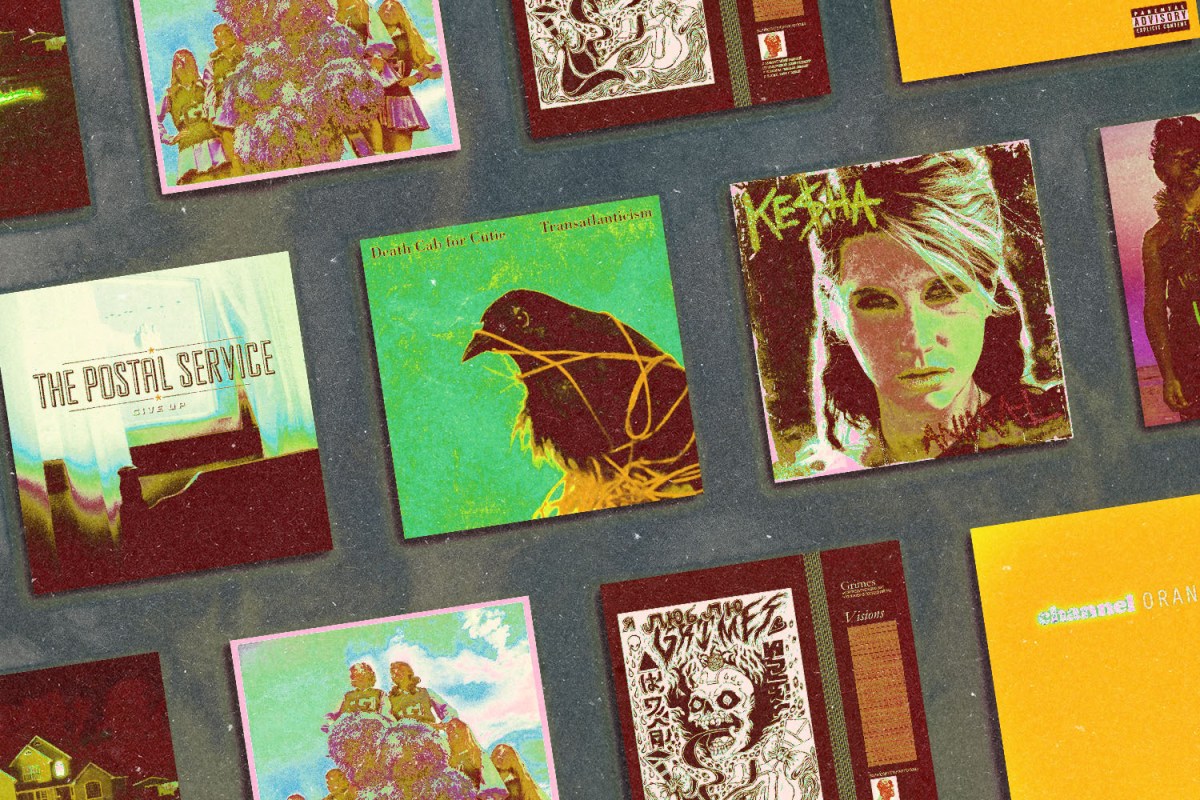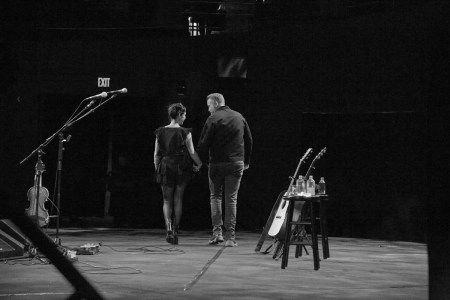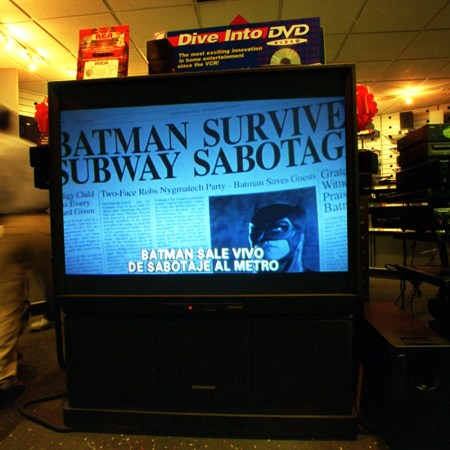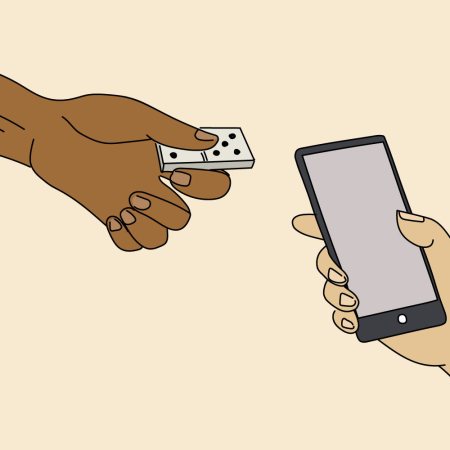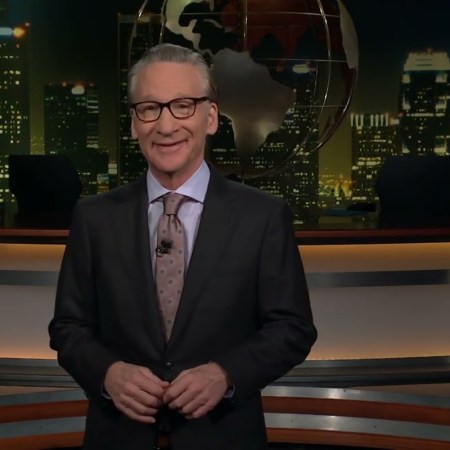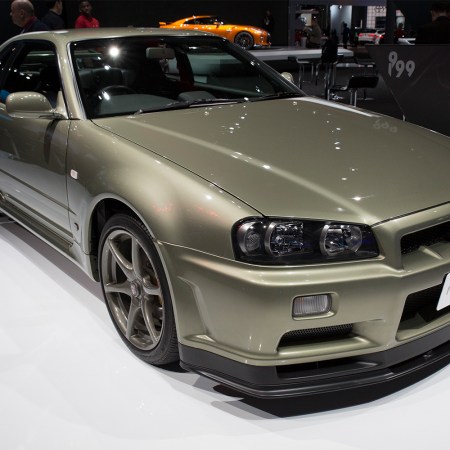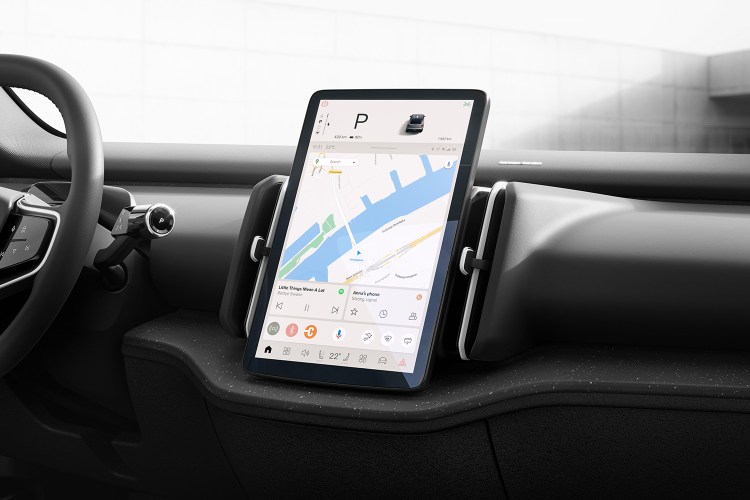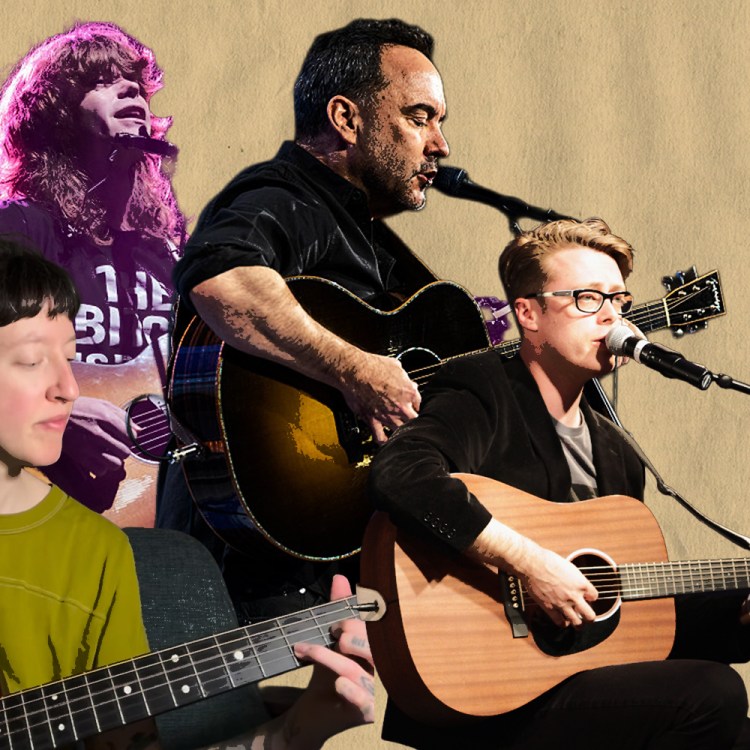A month ago, I made a tweet asking what everyone believed to be the most innately millennial album. No, not the best album, or even the best album made by artists who match the generational aging curve. Instead, I wanted to know if we could come together and agree on one album that best exemplified the emotional and physical qualities we’ve all determined to be “millennial” in nature — which, I admit, is beholden to no objective parameters. It gets tricky! You immediately need to disqualify all of the great records of the 2000s and 2010s that were composed by Gen Xers and hold a distinctly Gen X perspective on the world. Radiohead‘s In Rainbows kicks ass, but it isn’t exactly a millennial album. The same goes for bands who fit the demographic but are drawing from an older set of influences. I adore Celebration Rock by Japandroids, but the reason I love it is because I can easily envision it tearing up MTV2 in 1998.
“Running With Our Eyes Closed” Is More Marriage Doc Than Music Doc
The marriage between Jason Isbell and Amanda Shires is the heart and soul of director Sam Jones’s latest filmAnd yet, despite the elasticity of those rules, my tweet quickly swelled with strong candidates for the title. I decided to compile them in a list below, and make the case, (or present a counter-argument), for why each of them can claim superior millennial album resonance. This is a deeply subjective and anti-scientific task, so I’m going to lay out my biases from the start. I think millennial identity — at least within reductive thinkpiece logic — is buoyed by a burdensome, panoptical self-reflexiveness, which is why hashtaggable *relatability* became the tantamount quality of all celebrity culture in the 2000s. An anachronistic sense of selfish nostalgia is also oddly important because I was surely not the only 18-year old listening to Washed Out and reminiscing about the “good old days” of four summers ago. There is also a know-it-when-you-see-it millennial texture present in our party music of the time, that I think can be best expressed as a cascading collapse of genre context. (See: Ke$ha, Girl Talk, “dance-punk” and so on.) The albums that present these tenets are going to be higher up in my tier list, and if you disagree with me, take comfort in the fact that generations themselves are an inherently fraudulent concept, and we’re just trying to have some fun on the internet.
With those caveats out of the way, let’s get to the nominees.
Death Cab For Cutie — Transatlanticism
I am of the controversial opinion that apex Death Cab, in the 2000 to 2004 range, has a distinctly Gen X tinge. That might sound insane, but hear me out. Ben Gibbard, with his spidery guitar riffs, latent DIY sensibilities, and fragile, beta-male demeanor, was deeply beholden to prime, sweater-vest mid-90s emo. (Seriously, how can you call Death Cab For Cutie the definitive millennial band if they’re supposed to crossover with the indie sleaze, American Apparel era?) Transatlanticism certainly radicalized a number of bookish dweebs at the turn of the century, but I always felt that Gibbard’s contemporaries — Arcade Fire, Sufjan Stevens, TV On The Radio and so on — existed in their own distinct phylum. (In other words, none of those bands seem like big Sunny Day Real Estate adherents.) In fact, I’d argue that the only reason people lump Transatlanticism within the overarching millennial tide is the album’s adjacency to The OC, where Seth Cohen constantly sang its praises. Cohen, of course, is an unabashed analogue of the show’s creator: 46-year old Josh Schwartz, who is and always will be an actual Gen Xer. I think I’m right about this one, guys.
RATING: 3/10
The Postal Service — Give Up
The counter to my Death Cab position is that Give Up, which arrived in the same year as Transatlanticism and presents an alternative history where Ben Gibbard grew up obsessed with New Order instead of The Cure, radiates with a much higher degree of mid-00s energy. I can’t really argue with that sentiment. The Postal Service’s chilly, low-key computer blips were far more predictive of millennial taste than anything in the Death Cab oeuvre, and the record possesses enough era-defining flashbulb moments — like a goddamn Jenny Lewis feature! — that it has to be a serious contender. If you want to slot this higher, be my guest, but I still maintain that Gibbard cuts a cleaner Gen X silhouette.
RATING: 7/10
Ke$ha — Animal
Ke$ha has to at least be acknowledged here, because one of the defining marks millennials left on the world was the global canonization of hip-hop, (which was good!) and the simultaneous destruction of the cultural precepts protecting a culture built from the ground up by Black artists, (which was perhaps less good.) Animal was the absolute avatar of this vibe shift; an out-of-nowhere smash starring a glitter-doused white girl from L.A. rapping about Jack Daniels, and getting crunk, and hooking up with dudes who look like Mick Jagger. Ke$ha, of course, didn’t mean any harm, and it generally seems like she’s a good hang. But her success directly opened the door for so many depressing hucksters — Lil Dicky, Iggy Azalea, Hoodie Allen — who’d go on to commit untold crimes against the genre. A more politically cogent generation would’ve been much more careful with their appropriation, but we took “Tik Tok” to number one in the country without ever considering the potential carnage. Our bad!
RATING: 6/10
Sleigh Bells — Treats
There is nothing about Treats that relates back to millennial emotional fundamentals. The 32-minute runtime contains no meta-ironic ennui, or tedious Epic Bacon humor, or toxic oversharing, or references to extremely specific brands of mental health pharmaceuticals. Instead, it makes this list because there is just something about Sleigh Bells’ music that condenses the essence of 2010 with spectacular, subdermal lucidity. Treats is textually bereft and tonally vacuous, and as the years march onwards, its only real legacy is an ability to incubate a synesthetic mirage of the boys and girls we used to be; leaving the house in plastic, Coors Light-branded wayfarers in order to rock out at a humid mid-afternoon festival set in the thrall of a garage rock band that seemed strangely contiguous with Balenciaga. You had to be there, man. I never listen to Sleigh Bells anymore, because I fear what they might awaken within me.
RATING: 8/10
Grimes — Visions
For my money, Visions is the first album to ever internalize the intangible aesthetic of a long, sweaty cyberspace binge. Grimes was once just a Tumblr-damaged art kid and a million miles removed from her Elon Musk co-parentage. In those happier years, she drummed up an album full of sleek, onyx, goth-synth melodies, which paired perfectly with her ultraviolet falsetto. The record weaved in a number of ethereal, hypertext influences; J-pop, Metal Gear Solid, Neon Genesis Evangelion, the lo-fi burbles of Windows 98 browsers, and the rest was history. It was so easy to claim Grimes as a hero, because it genuinely felt like one of the Toonami-addicted deadbeats you knew in high school — an extremely millennial archetype — suddenly became galactically famous. The only real demerit I can think of is that Visions might actually herald the dawn of the Zoomers. Billie Eilish owes her back tax.
RATING: 6/10
Girl Talk — Feed The Animals
A strong dark horse. No artist encapsulated the polyglot shape of millennial music consumption better. (If you too attended an early-2010s SXSW party co-headlined by both Black Lips and, like, Trinidad James, then you know what I’m talking about.) Girl Talk would play shows in nothing but boxers and an aerobics headband, like a Pitchfork-approved interpretation of LMFAO-esque debauchery. The mashups on Feed The Animals were fused together on a laptop, which caused an existential dilemma for the graying, rockist, music-crit contingency. Can someone claim exclusive authorship on the “Lollipop” acapella bolted onto the “Under The Bridge” instrumental? Does that count as a song??? If only they knew that 15 years later, Bebe Rexha would reach the Billboard Top 10 by adding three-and-a-half new lines to “Blue (Da Ba Dee.)” In retrospect there is some racial fraughtness with the whole Girl Talk experience. Why, exactly, were these glassy-eyed hipsters only comfortable listening to a Soulja Boy song when it was accompanied by an Aphex Twin beat? But clueless irony is about as crucial to the millennial experience as Levi 511s, and that puts Girl Talk in pole position.
RATING: 8/10
Frank Ocean — Channel Orange
Personally, Channel Orange is my top choice, if only because I think it’s the only album on this list that makes a conscious attempt to engage with the millennial experience. Ocean’s languid, solitaire, eternally melancholy R&B milieu happily cribbed from Blogspot indie and FM-radio pop; it would be idolized, and never replicated, by artists for years afterwards. The features transcend all tonal logic but still follow its own dreamlike pattern. Earl Sweatshirt shows up to rap about the disorienting sensation of partying at a rich kid’s estate, before John Mayer unsheathes the greatest and most inexplicable cameos of his career. Ocean is the composite millennial, in the sense that he was in his mid-20s and still completely throttled by wistfulness for the very recent past. (The first track on the album is the Playstation boot-up chime!) Everything he puts into the world seems to wrestle with his own crippling vanity; a dueling desire to be known by everyone and to disappear completely. I hate to say it, but I totally relate.
RATING: 9/10
MGMT — Oracular Spectacular
Oracular Spectacular checks all of the boxes. MGMT is a band formed by two Frodo-haired soft-boys at a Northeast liberal arts institution. They once dressed in questionable, Native American-coded cosplay on stage, giving way to a uniquely regrettable period of millennial scenedom where kids would stomp around the late-afternoon Coachella glow in headdresses and warrior paint. The band’s first hit, “Time To Pretend,” is a tongue-in-cheek paean to the pure-id excesses of rock and roll stardom of a previous era, which seemed totally unobtainable for a generation that prided itself on punitive self-awareness. They wielded that buzzing, chainsaw synth sound with perfection, deploying it over and over again in “Electric Feel,” (a painfully twee song about sex,) and “Kids,” (a song about lost innocence written by a pair of 24-year olds) to wondrously unit-moving effect. In typical millennial fashion, MGMT immediately recoiled from the spotlight and desperately clung to an underground code of ethics that was slowly losing all currency. The duo released a series of difficult, intentionally self-sabotaging follow-ups to stymie their own momentum, before eventually stumbling into another hit — “Little Dark Age” — more than a decade later. MGMT proved that even when millennials were having a blast, we tended to take things a little too seriously. We love our alienated kings.
RATING: 10/10
This article appeared in an InsideHook newsletter. Sign up for free to get more on travel, wellness, style, drinking, and culture.
